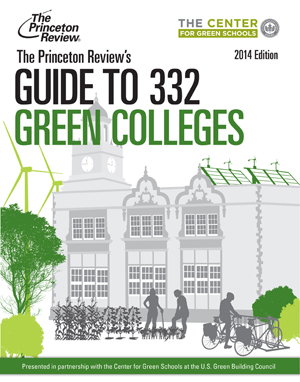Campus News
UCSC highlighted in Guide to Green Colleges
UCSC is one of four UC campuses scoring 99 points–the most possible–in The Princeton Review’s Guide to 332 Green Colleges, a free guide featuring colleges with a strong commitment to the environment and to sustainability.

UC Santa Cruz is one of four UC campuses scoring 99 points—the most possible—in The Princeton Review’s Guide to 332 Green Colleges: 2014 Edition, free, downloadable guide featuring colleges with a strong commitment to the environment and to sustainability.
The guide cites UCSC for waste diversion, student activism, and sustainability research. The campus diverts 64 percent of its waste from landfills, putting it well on its way to meet the UC system goal to produce zero waste by 2020. The campus Sustainability Office has a database of project ideas submitted by students, faculty, and staff to improve sustainable practices. Students can also apply for grants to pursue initiatives that reduce carbon emissions on campus.
Published with the U.S. Green Building Council’s Center for Green Schools, the guide lists 332 schools–330 in the United States and two in Canada–that are among the most environmentally friendly. The book does not rank the colleges but calls out the 22 with the highest possible scores. These were previously named to the Princeton Review‘s “Green College Honor Roll” for 2014.
All nine UC undergraduate campuses are among the 332 best green colleges, according to the guide. Alongside UCSC with perfect scores for sustainability are UC Irvine, UCLA, and UC Santa Barbara.
“In collaborating with the Princeton Review on this annual guide, we have seen that sustainability on campuses continues to be an important deciding factor for today’s four-year college bound students,” said Rachel Gutter, director of the Center for Green Schools at the U.S. Green Building Council.
The guide can be downloaded at www.princetonreview.com/green-guide or www.centerforgreenschools.org/greenguide.
“The schools on our Green Rating Honor Roll demonstrated truly exceptional commitments to sustainability across the key issues we looked at—from course offerings and recycling programs to plans for reducing greenhouse gas emissions,” said Robert Franek, the Princeton Review‘s senior vice president and publisher. “We salute their administrators, faculty, and students for their collective efforts to protect and preserve our environment.”
UC’s Policy on Sustainable Practices guides campuses in nine areas: green building, clean energy, sustainable transportation, climate protection, sustainable operations, waste reduction and recycling, environmentally preferable purchasing, sustainable foodservice, and sustainable water systems.
UC President Janet Napolitano has called for UC to achieve complete carbon neutrality by 2025.
The Princeton Review tallied its “Green Rating” scores based on responses to a 2012-13 institutional survey that asked:
1) The percentage of food expenditures that goes toward local, organic or otherwise environmentally preferable food.
2) Whether the school offers mass transit programs, bike sharing, facilities for bicyclists, bicycle and pedestrian plans, car sharing, carpool discount, carpool/vanpool matching, cash-out of parking, prohibiting idling, local housing, telecommuting, and condensed workweek.
3) Whether the school has a formal committee with participation from students that is devoted to advancing sustainability on campus.
4) Whether buildings that were constructed or underwent major renovations in the past three years are LEED certified.
5) The school’s overall waste diversion rate.
6) Whether the school has an environmental studies major, minor or concentration.
7) Whether the school’s students graduate from programs that include sustainability as a required learning outcome or include multiple sustainability learning outcomes.
8) Whether the school has a formal plan to mitigate its greenhouse gas emissions.
9) The percentage of the school’s energy consumption that is derived from renewable resources.
10) Whether the school employs a dedicated full-time (or full-time equivalent) sustainability officer.